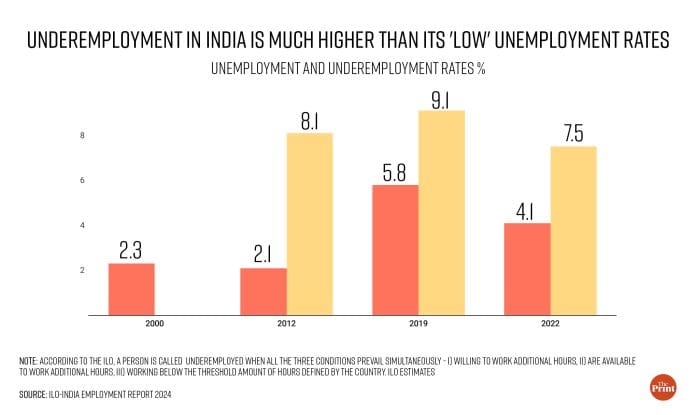Thank you dear subscribers, we are overwhelmed with your response.
Your Turn is a unique section from ThePrint featuring points of view from its subscribers. If you are a subscriber, have a point of view, please send it to us. If not, do subscribe here: https://theprint.in/subscribe/
India is producing more engineering graduates than ever before. Each year, hundreds of thousands leave their colleges with degrees in hand, only to find themselves stuck in the same spot months—and sometimes years—later: unemployed, frustrated, and disconnected from industry demands. The numbers tell a grim story: almost half of engineering graduates in the country are without a job or even an internship. The root problem is increasingly clear. Most of these graduates are simply not relevant for the jobs they chase.
The Reality: How Time Is Really Spent
Let’s drop the polite talk. Most young, unemployed engineers spend their days locked in unproductive routines.
- Job Hunting Without Direction: Most apply endlessly for openings online, copy-pasting resumes and hoping for miracles—but rarely analyze job requirements or update their skills meaningfully.
- “Timepass” Activities: Instead of upskilling, many drift into distractions. Boys gather in public spaces, play games, gossip, and binge-watch shows. Girls are often pulled into household chores, family duties, social media, and endless TV. Both groups lose themselves in passive entertainment, social platforms, or “idle” exam prep with little seriousness or focus.
- Waiting Games: Too many “prepare” for government exams or higher studies not out of passion, but as a way to evade the industry skills gap. Actual time spent on focused learning is minimal.
- Not Building Skills: Upskilling is rare. Most haven’t done a project, interned in a real company, or created anything that proves their abilities. The hard truth: very few are work-ready.
The Gendered Divide
- Boys: Many young men are spending excessive time in passive leisure—hanging out aimlessly with friends, gaming, binge-watching shows or following social media trends, often at the cost of genuine skill acquisition. Side conversations about jobs, careers, or “preparation” for exams are common, but these often turn into group procrastination sessions. There is less willingness to take on household responsibility or actively seek out professional networking and mentorship. The tendency is toward escapism—seeking distraction rather than discipline, which stalls progress toward industry relevance.
- Girls: In metros and big cities, young women are deeply absorbed in digital distractions—spending significant hours on social platforms (Instagram, Snapchat), engaging with friends over relationship trends, “GenZ” lingo, and influencer culture. Mental energy gets consumed by peer validation, online presence, and drama around modern relationships, which often overshadows consistent upskilling or professional development. While family expectations and social norms still play a role for some, for many urban women graduates, distraction—not domesticity—is now the chief barrier to career advancement.
Why Are So Many Still Unemployable?
The answer is not just a lack of jobs—it is a painful mismatch between what industry wants and what most fresh graduates offer. Colleges keep doling out outdated syllabi and rote learning. At home, parents and society pile on pressure but offer little guidance on building actual job skills.
What Needs to Change—And Fast
It’s time to face facts. If you’re a young, unemployed engineer reading this, here’s what you must do—now—to become relevant and land the job you desire:
- Get Real-World Skills: Learn to code, master industry-standard tools (Python, Excel, AutoCAD, whatever your domain needs). Build actual projects that you can show employers.
- Intern—Even If Unpaid: Hands-on work, even at a startup or NGO, is better than watching TV at home. Get experience and build a portfolio.
- Stop Idle Exam Prep: Don’t hide behind the excuse of “preparing” for years. Commit to a timeline, and if you fail, move on to skill-building.
- Use Online Resources: Countless free platforms (Coursera, Udemy, Khan Academy, LinkedIn Learning) cover everything from programming to communication and business basics.
- Network and Seek Mentors: Reach out to working professionals on LinkedIn, attend webinars, and ask questions—don’t sit alone waiting for miracles.
- Prove Yourself Digitally: Contribute to open source, upload your work to GitHub, show your projects on LinkedIn, or participate in competitions.
- Discipline Above All: Set a daily schedule that prioritizes learning or work over distractions. Your peer group matters—avoid endless “timepass” with others in the same rut.
Final Word
Industry does not owe you a job. Relevance is earned, not gifted. If you spend your best years socializing, watching content, or drifting through household work and empty exam prep, you will not get hired. If you build real skills, prove your value, and show the grit to learn what the market wants, you’ll stand out—in India or anywhere. The choice is up to you.
These pieces are being published as they have been received – they have not been edited/fact-checked by ThePrint.


